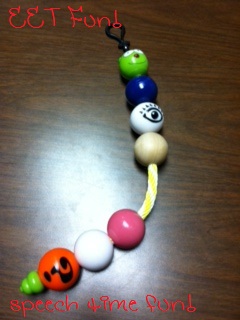Have you seen these three letters, EET, floating around Pinterest and Speechie Blogs?! Are you wondering what they mean and what the hype is all about?! Well, they stand for Expanding Expression Tool! This amazing idea and product was created by a fellow Speechie, Sara L. Smith. It is a multi-sensory approach to teaching students how to expressively describe!
How does it work? Students must be taught what each “bead” represents on the Expanding Expression Tool (EET). The beads represent different describing concepts: category, function, looks, parts, where do you find it, what is it made of, and more! I like to use a visual I created (but the kit comes with a poster) and I go through what each bead means one lesson at a time. It is fascinating to realize how many students do not know names of materials objects are made of or where to find them! My students always respond with “99 Cents Store” or “Wal-Mart” when asked where they find it! I have to prompt them with, and then where do you put it after you buy it!
Once my students start to understand what each bead means, we play a variety of games where student must come up with answers for each bead. They must try and touch all beads when describing the concepts in the games we play. Some games I use to help practice: Headbanz, Memory, Bag Game app, or Describe with Art app (just to name a few!).
To help students make carryover with this skill into the classroom, I have students practice using the EET with their curriculum vocabulary. We practice describing space concepts, branches of government, and even fractions! For older students, I like to take a non-fiction story about an invention or object and have them complete an EETgraphic organizer based on information learned from the story.
To learn more about how I use EET in my therapy room, check out the links below:
If you cannot guess, I highly recommend the EET for SLPs! I look forward to continue using it in my therapy room and watching my students make even more progress!



No comments:
Post a Comment